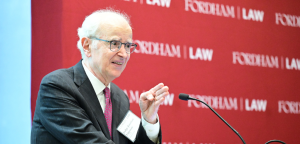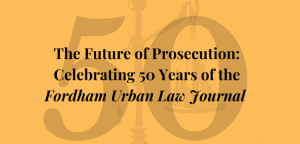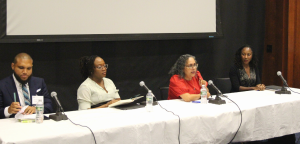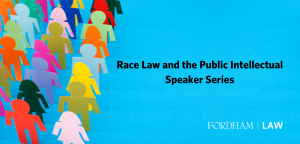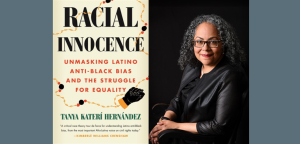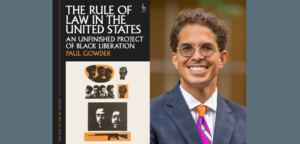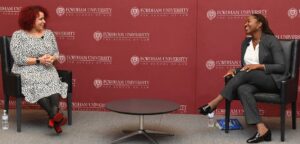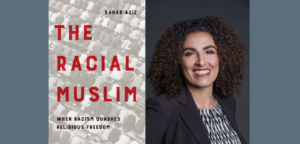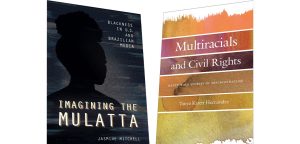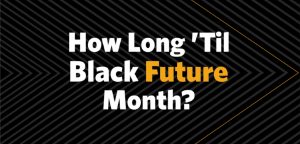Center on Race, Law and Justice
About the Center
The above words were written in 2016, when Fordham's Center on Race, Law and Justice was first launched, but could have easily been written today. Indeed, given the ongoing protests over police violence, the racial inequities brought to the surface by Covid-19, and an administration that seems openly hostile to racial minorities, the work of the Center on Race, Law and Justice seems more urgent than ever.
Since its launch in 2016, the Center on Race, Law and Justice has become a national voice in:
- intervening in current debates about race, citizenship, and democracy
- promoting critical, interdisciplinary, and methodologically innovative scholarship and approaches to understanding race and discrimination
- generating insights and solutions necessary to achieve real and positive change on race issues
- collaborating with law firms and other legal institutions to address issues of diversity and access in the legal profession
- establishing the LEAP pipeline program (now call IDEAL) to increase diversity in education and the law by identifying talented underrepresented college students in the New York City area and exposing them to the legal profession
Our Mission
Going forward, and with its new Director, Professor Bennett Capers, the Center on Race, Law and Justice is committed to playing an even greater role for students at Fordham Law School, and for the community at large, both domestically and internationally. Law schools have always played an important role in the movement for equality. The Center looks forward to being at the vanguard of that movement.
The Center works to generate innovative responses to racial inequality and discrimination. It prioritizes law, data, and social science-informed interventions capable of creating concrete change in communities, institutions, and public policy in a number of areas in the domestic and global contexts. The Center maximizes real-world impact through cross-disciplinary collaborations, comparative analyses, and systemic interventions that push the boundaries of traditional approaches to race and inequality. Founded in early 2016, the Center marks an effort to marshal the tremendous research capacity and expertise at Fordham University on race and urban issues directly relevant to the University’s social justice mission, location in New York City, and status as one of the premiere research institutions in the country.
-
The Center’s approach to race and law incorporates fields such as history, sociology, and political science and features analytical tools drawn from:
- Critical Race Theory
- Comparative Law
- Empirical Methods
- Structuralism and Institutional Reform
- Legal History
- Feminist Legal Theory
-
- Affirmative Action
- Antidiscrimination
- Civil Rights Advocacy
- Criminal Law and Procedure
- Community and Economic Development
- Education
- Employment
- Environmental Justice
- Family and Family Advocacy
- Health and Biomedical Ethics
- Housing
- Human Rights
- Immigration
- International Development and Sustainability
- Internet and Information Technologies
- Legal Ethics
- Legal History
- Legislation
- National Security
- Poverty
- Urban Studies
- Voting Rights
- Workers Rights and Solidarity
-
The Center functions as an incubator and a platform for advancing cutting-edge interdisciplinary scholarship on racial identity, cumulative disadvantage, and racial justice tools that are grounded in critical analyses, empirical methods, and comparative inquiry.
It helps generate original research and analysis of core civil rights and social justice issues.
It promotes innovations in legal pedagogy, practice, and professionalism in relation to issues of race, civil rights, and diversity.
-
The Center on Race, Law & Justice is grateful to the members of its advisory board for providing invaluable guidance and support throughout the year.
Vivian M. Arias, Esq. ’07
Partner
Holland & Knight, LLPThe Honorable Denny Chin ’78
Judge
United States Court of Appeals for the Second CircuitAngelo R. Guisado, Esq. ’12
Staff Attorney
Center for Constitutional RightsNoah S. Heller, Esq. ’00
Chief Executive Officer
Katten Muchin & Rosenman, LLPMichelle Y. Johnson-Lewis, Esq. ’93
Retired Pharmaceutical/Biotech Legal ExecutiveMichael Kim, Esq. ’97
Partner
Blank Rome LLPRachel M. Kleinman, Esq. ’05
Senior Counsel & Director of Professional Development
NAACP Legal Defense and Educational Fund, Inc.William Malpica, Esq. ’00
Partner
Martin LLPWillajeanne F. McLean, Esq. ’86
Faculty, Law Instruction and Research
University of ConnecticutErika K. Thomas, Esq.
Partner
Baker Hostetler





